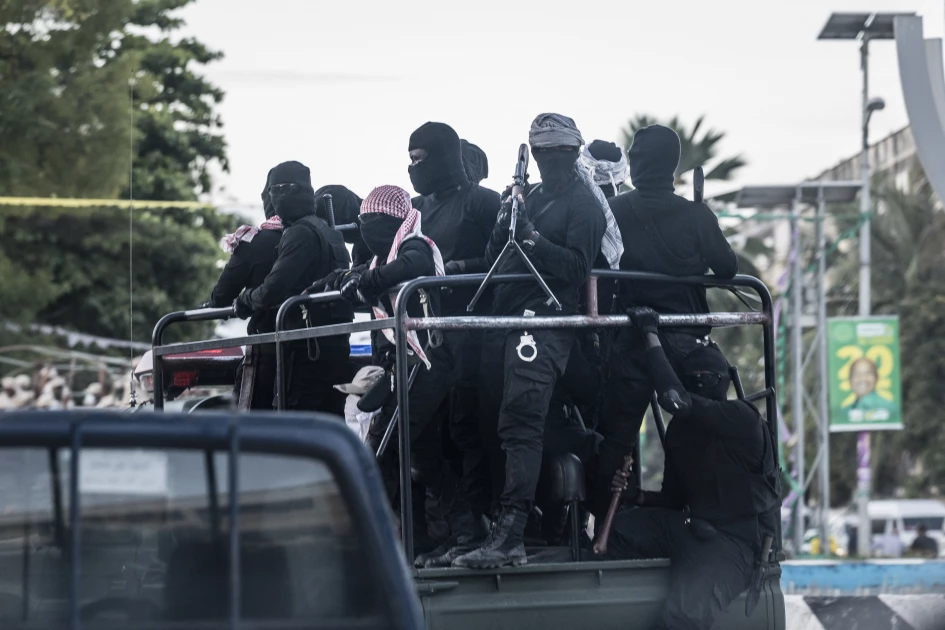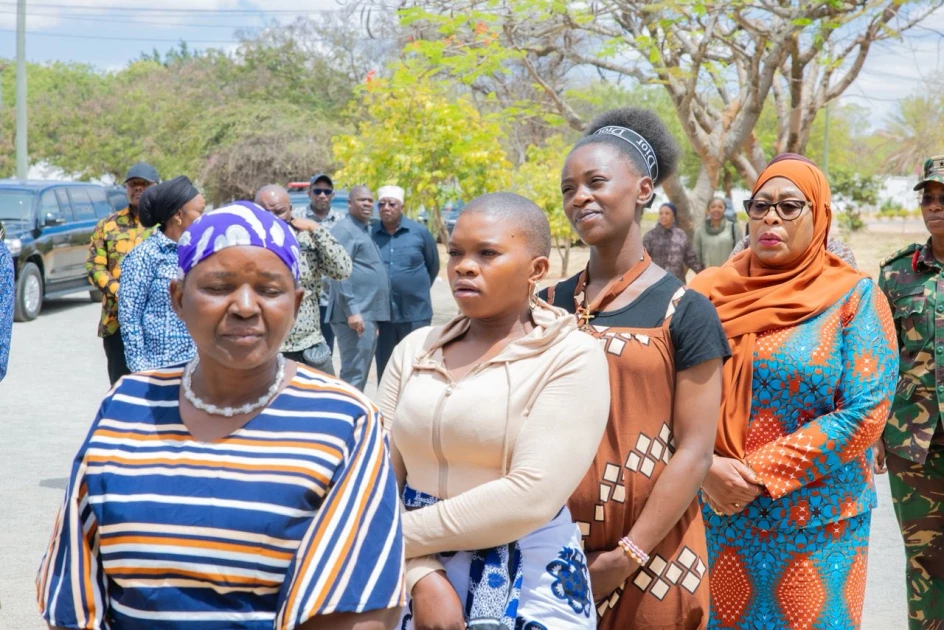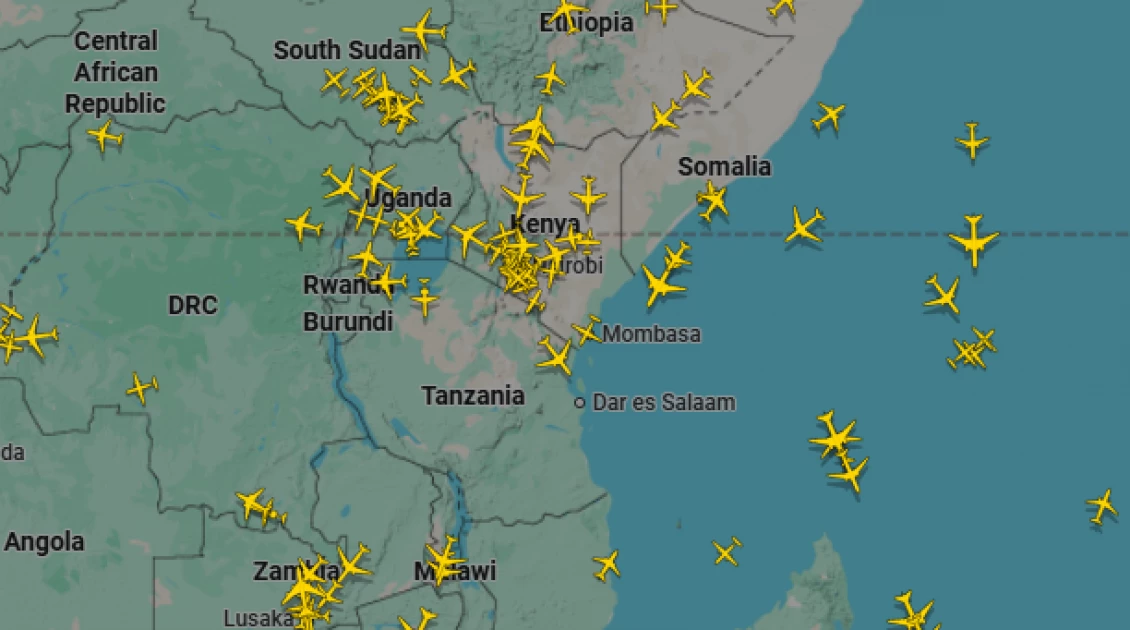Cameras off! Lights off! A disconnected Tanzania bleeds in the dark

Masked armed men bearing no visible insignia or identification drive in the back of a pickup truck past electoral posters of the ruling Chama Cha Mapinduzi (CCM) candidate and incumbent Zanzibar President Hussein Ali Mwinyi in Stone Town on October 30, 2025. Photo by MARCO LONGARI / AFP

Audio By Vocalize
The elections were one to watch as Suluhu’s government was facing accusations of undermining democracy, cracking down on opposition, and acting in favour of the ruling Chama Cha Mapinduzi (CCM) party.
In the Presidential race, Suluhu is considered to have run unopposed after Chadema, the main opposition party, was, on April 12, 2025, barred from contesting presidential and parliamentary elections.
This was after Chadema Party leader Tundu Lissu was arrested at a public rally where he called for electoral reforms, and thereafter charged with treason.
With Lissu behind bars since April, other Chadema party officials have also faced arrest. John Heche, deputy chairperson of Chadema, was also arrested on October 22, in what the opposition has termed as efforts to detain them until after the elections.
A nation in the dark
The lights began to dim in Tanzania on election day. In the newsroom, we observed the Tanzania Broadcasting Corporation (TBC) give only updates that the electoral process was ongoing, before shortly returning to a cooking programme.
The other momentous report is when Suluhu was on Saturday declared the winner of the presidential vote on Saturday, having garnered 98% of the vote.
Today, President-elect Samia Suluhu takes the oath of office far from the glare of cameras, with no civilians to witness it.
State television TBC has said the public would not attend the inauguration, which would be held in the State House in the capital Dodoma, rather than at a stadium as has been before.
On the evening of the election day, curfew was declared in Tanzania’s capital, Dar es Salaam, after violent protests marred the electoral process. Dar es Salaam Special Zone Police Commander, Jumanne Muliro, declared that the curfew would commence from 6:00 pm on Thursday, without specifying when it would be lifted. Military officers were deployed to patrol the city.
At the same time, an internet outage was reported in Tanzania, where a power outage has also been reported. This has left the nation isolated in the dark, as international media grapples with access to information.
Among the last verifiable tweets I saw was that of Tanzanian President Samia Suluhu, in a queue, waiting for her time to cast her vote, then showing election ink on her small finger.

This was hours before the lights, cameras, and connections went off in Tanzania.
The total internet blackout has blocked outsiders from accessing verifiable information from Tanzania, where the AFP reports that hundreds - perhaps even thousands - have died since protests broke out on election day.
Embassies such as the United Kingdom and the United States of America have since been issuing travel advisories for their citizens and staff.
A Sunday statement from the Foreign, Commonwealth & Development Office (FCDO) advised staff to avoid all but essential travel to Tanzania, limit movements, adhere to the curfews, monitor local media, and follow the advice of the local authorities.
"There are shortages of food, fuel and cash, which have been compounded by the lack of internet services. There is also uncertainty around international transport options," the UK advisory stated.
Other foreigners have reported that they experienced challenges departing for their home countries. Kenyan Music Publicist Anyiko Woko told the BBC that she was stranded in Dar es Salaam since Wednesday, and was able to leave on Saturday morning.
Anyiko further reported that “many Tanzanians are unable to share their own stories and are stuck at home, or at their workplaces, with no essentials like food, water and connectivity.”
Several flights have since been cancelled in Tanzania, with continued reports of transport paralysis.
Flight traffic data from Flight Radar, captured at 9.45 am EAT, showed 3 flights in the Tanzanian space. The number was quite lower than that in neighbouring countries.

In the dark, there have also been reports of deaths, with limited reportage on the same and unverifiable data.
On Saturday, the Opposition party Chadema reported that about 700 lives had been lost. A number that the media has yet to verify due to media restrictions in the East African nation.
Disinformation thrives in the dark
Lack of information access has also corrupted information integrity in Tanzania elections, with international media outlets having been denied entry to the country or accreditation credentials.
As a result, social media platforms in neighbouring countries such as Kenya and Uganda are awash with unverifiable videos and photos of the situation in Tanzania. Some social media users have used AI-generated images to imply the state of affairs in Tanzania.
Platforms such as TikTok are flooded with viral video clips, including one implying that Suluhu has since sought asylum in Uganda. A video clip that Citizen Digital has found to be misleading, as it features Suluhu’s tour of Mwanza on September 8, 2021.
Calls for peace and tolerance
International bodies have since urged peace, dialogue and political tolerance in Tanzania. In a congratulatory message to Suluhu for her re-election, African Union Commission (AUC) Chairperson Mahmoud Youssouf expressed deep regret over the loss of human life during the post-electoral protests. The AUC chair called for respect for the rule of law, human rights, fundamental freedoms, and political pluralism.
Pope Leo XIV has also called for prayers for Tanzania. “May we also #PrayTogether for #Tanzania, where, following the recent elections, violent clashes have broken out, leaving many victims. I urge everyone to avoid all forms of violence and to follow the path of dialogue,” the Pontifex wrote in a tweet.
United Nations Secretary-General António Guterres also condemned the electoral violence in Tanzania, expressing readiness to spearhead dialogue.
“I call on all to exercise restraint, reject violence & engage in inclusive & constructive dialogue to prevent further escalation,” said Guterres.
The Southern African Development Community (SADC) has also said that the region is “closely monitoring developments” in Tanzania.
“SADC calls upon all stakeholders to exercise maximum restraint and refrain from actions that may further escalate violence and unrest,” appealed Malawi President Arthur Peter Mutharika, Chairperson of the SADC Organ on Politics, Defence and Security Cooperation.


Leave a Comment